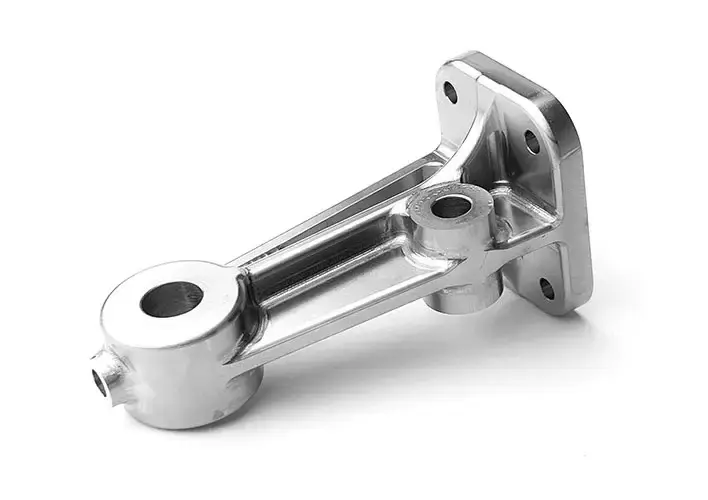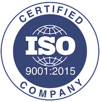STEEL S355J2
Discover the excellent mechanical strength and ease of processing of S355J2 Steel: the ideal material for structural applications, heavy machinery and extreme environmental conditions

PROS
- High Mechanical Strength
- Hardness at Low Temperatures
- Excellent Machinability
CONS
- Corrosion Sensitivity
- Cost Considerations
- High Density/Weight
MAIN FEATURES
- Machining process: CNC Machining
- Tolerances: ISO 2768-1 fine (f) or medium (m) class. Info
- Max size: 110x110x500 mm (4.3x4.3x19.7 in)
- Lead time: <6 days
STEEL S355J2 CNC MACHINED VIDEO GALLERY
High Mechanical Strength
S355J2 Steel offers excellent tensile and compressive strength, making it the ideal choice for structural and engineering applications requiring high mechanical strength. Its strength is essential in applications such as bridge construction and heavy machinery.
Hardness at low temperatures
It is especially appropriate for environments with temperature variations or under dynamic loads, as it preserves its mechanical properties even at low temperatures. This makes it an excellent choice for projects in extremely cold environments or for applications such as refrigeration units and cold storage facilities.
Excellent Machinability
This steel is easily machinable, both at cold and hot temperatures, making it versatile for various manufacturing processes and valuable for complex structural parts. Its excellent machinability covers forming, welding and cutting, making it an ideal material for a variety of industrial applications such as machinery, vehicles and construction elements.
IMAGE GALLERY
QUOTE NOW YOUR PARTS
free instant quoteCOMMENT
S355J2 Steel is an outstanding engineering material that combines a number of advantageous properties. Its high mechanical strength and excellent machinability make it suitable for demanding structural and mechanical applications, while its resilience at low temperatures offers increased reliability. Although it has a higher cost than other materials and requires some precautions against corrosion, its overall performance often justifies these aspects. It makes it a versatile choice for a wide range of industries, from heavy machinery to offshore installations.
Pros
• High Mechanical Strength
With exceptional tensile and compressive strength, S355J2 Steel has become essential in applications requiring a high degree of strength and resistance to mechanical stress. Its high yield strength makes it an excellent choice for structural parts that must withstand substantial loads and provides a strong safety grid against unforeseen forces that could cause failure. This feature is particularly advantageous in highly engineering contexts, such as earthquake-resistant constructions or high-speed railway systems. In addition, its unique mechanical profile allows thinner and stronger parts to be constructed, which can be crucial for optimising weight and material costs in large-scale projects. The high mechanical strength of S355J2 Steel sets a new standard for durability, making it an excellent choice for all applications where material failure is not an option.
• Hardness at Low Temperatures
By keeping its mechanical properties even at low temperatures, S355J2 Steel becomes advantageous in harsh environmental conditions. This is essential in sectors such as aerospace, outdoor construction or offshore operations, where materials are exposed to extreme temperatures and must still function safely. Its resistance to low temperatures also makes it ideal for cold storage facilities, arctic installations and high altitude applications, where maintaining material integrity can be critical for both safety and functionality. The ability to withstand dynamic loads in cold conditions extends its use even further, for example for heavy machinery operating at fluctuating temperatures. This feature adds a further level of versatility and reliability, especially in applications where thermal performance cannot be compromised.
• Excellent Machinability
Easily machined both cold and hot, S355J2 Steel offers unmatched versatility for different manufacturing processes. This is a particularly significant advantage when producing complex structural parts or using advanced manufacturing techniques. The excellent machinability of the material extends its application scenarios to sectors ranging from automotive, aerospace, construction and industrial machinery. The ease of handling allows for shorter production cycles and reduced labour costs, making it not only a reliable but also a cost-effective option. This machinability is often essential to meet the rigorous precision and quality standards required by todays advanced applications.
Cons
• Corrosion Sensitivity
Although tough, this type of steel is corrosion-sensitive and may require additional protection, such as galvanisation or specialised coatings, especially in wet or corrosive environments.
• Cost Considerations
Although S355J2 Steel boasts high mechanical properties, this comes at a certain cost. Compared to other types of steel, S355J2 can have a higher price. This is often due to the advanced technologies and processes required to produce it, as well as its superior performance features. The cost factor is an important consideration for budget-sensitive projects, but is often justified by the longevity and durability of the material, especially in demanding structural and engineering applications.
• High Density/Weight
Due to its high density, it poses logistical challenges that can affect transport and assembly. For construction projects or other applications where weight is a critical factor, the heavy nature of this material may require additional planning and may also affect overall project costs. While the weight emphasises its robustness, it also means that it may not be the best choice for projects that require lighter, more easily handling materials.
Comparison to other materials
Stainless Steel
Corrosion Resistance: Stainless steel is far more corrosion-resistant compared to S355J2 steel.
Mechanical Strength: Generally, S355J2 steel offers higher mechanical strength compared to most stainless steels.
Cost: Stainless steel tends to be more expensive, especially if additional anti-corrosion treatments are required for S355J2.
Carbon Steel
Mechanical Strength: S355J2 generally offers higher mechanical strength compared to standard carbon steels.
Workability: Both are easily machinable, but S355J2 offers slightly better workability due to its mechanical properties.
Cost: S355J2 can be more expensive compared to standard carbon steel.
Aluminum
Weight: Aluminum is significantly lighter than S355J2 steel, making it more suitable for applications where weight is a critical consideration.
Mechanical Strength: S355J2 steel is much more mechanically robust compared to aluminum.
Cost: Aluminium can be more expensive for high-performance mechanical applications, since dedicated aluminium alloys may be required.
Conclusions
S355J2 Steel stands as a high-performance material that offers a unique blend of mechanical strength, workability, and hardness at low temperatures. This steel grade is a go-to choice for a range of engineering and structural applications, from heavy-duty vehicles and offshore equipment to industrial machinery and agricultural implements. Its mechanical properties make it ideal for scenarios that demand robustness and the ability to withstand substantial mechanical stress.
However, such a material has its disadvantages. Its sensitivity to corrosion requires additional protective measures, especially in corrosive or wet environments. The density of steel can also complicate logistical matters such as transport and on-site assembly, making it less desirable for projects where weight is a critical factor. Cost also comes into play: S355J2 can be more expensive than other steel grades, making it less suitable for projects with a limited budget.
When comparing S355J2 with other materials such as stainless steel, carbon steel, aluminium or titanium, it becomes clear that each material has specific pros and cons, and the optimal choice largely depends on the unique requirements of the application. Therefore, although S355J2 may be an ideal choice for many conditions, a thorough analysis and consideration is crucial to determine whether it is the best choice for a given project.
Overall, S355J2 Steel continues to be a reliable and versatile material that can meet the complex demands of modern engineering applications if used judiciously. Its combination of mechanical strength, excellent machinability and adaptability to low temperature environments make it a worthy competitor in the material selection process.
"As a structural engineer who specializes in heavy-duty machinery, I need materials that not only meet but exceed industry standards. After extensive research, I decided to go with S355J2 steel for my recent project and chose Weerg for the manufacturing process. I couldn't be more satisfied with the results!"
PROPERTIES
| Tensile breaking load | 510 MPa |
| Modulus of elasticity | 210 GPa |
| Elongation at break | 21 % |
| Density | 7,85 g/cm³ |
| Melting temperature | 1460ºC |
| Hardness | 190 HB |
| Yield strength | 355 MPa |
Questions and answers
S355J2 steel is a non-alloy structural steel belonging to the category of hot-rolled steels, with a minimum yield strength of 355 MPa for thicknesses up to 16 mm. The “J2” designation indicates that the steel has been tested for resilience at -20°C, making it suitable for applications in cold environments or subjected to dynamic stresses. This material combines high mechanical properties, excellent weldability, and good ductility, making it versatile and ideal for various industrial applications.
S355J2 steel is widely used in various sectors. In the heavy vehicle industry, it is employed for frames, supports, and other structural components subjected to high loads. It is an ideal choice for offshore equipment, where its toughness and ability to perform at low temperatures are crucial. It is also used in industrial machinery for mechanical and structural parts under repeated stress, and in agricultural machinery due to its resistance and durability in challenging environments.
Compared to other structural steels, S355J2 stands out for its combination of mechanical strength and toughness, particularly suited for low-temperature environments. For example, compared to S235JR, it offers a higher yield strength and better performance in high-stress applications. Compared to alloys such as S275, S355J2 has greater tensile strength and static load capacity, making it a preferred choice for more complex structures or those subjected to dynamic stresses. However, for extremely corrosive or marine environments, surface treatments or higher corrosion-resistant alloys might be required.
S355J2 steel is known for its mechanical properties, making it ideal for structural applications. Its tensile strength ranges from 470 to 630 MPa, with a minimum yield strength of 355 MPa for thicknesses below 16 mm. The material provides guaranteed resilience at -20°C, demonstrating its ability to absorb energy under impact conditions. Its ductility and weldability are excellent, allowing for easy processing without compromising performance. These characteristics make S355J2 steel a reliable choice for complex structures and demanding operating conditions.
QUOTE IN 1 SECOND WITHOUT COMMITMENT
DON'T WAIT: UPLOAD YOUR 3D FILE AND GET A QUOTE FOR YOUR PARTS NOW!
Upload your 3D file to get one step closer to manufacturing your parts.
free instant quote



